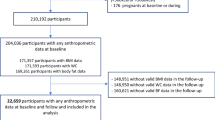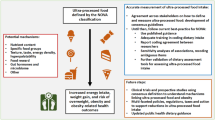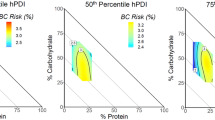Abstract
Purpose
To investigate the association between low-carbohydrate diet scores (LCDs) and the risk of type 2 diabetes in rural China.
Methods
A total of 38,100 adults were included in the Henan Rural Cohort Study. Macronutrient intake was assessed via a validated food-frequency questionnaire to create low-carbohydrate diet (LCD) scores. Multivariate logistic regression models and subgroup analysis were performed to estimate the odds ratio (OR) and 95% confidence interval (95% CI).
Results
After multivariable adjustment, participants with a high total low-carbohydrate diet score have a high risk of T2D (extreme-quartile OR = 1.23, 95% CI: 1.04–1.41; P = 0.007), whereas plant-based LCD score is not related to T2D risk. Among individuals with a BMI < 24 (extreme-quartile OR = 1.22, 95% CI: 1.01–1.47; P < 0.001) or high levels of physical activity (extreme-quartile OR = 1.42, 95% CI: 1.17–1.72; P < 0.001), the animal-based LCD score is positively correlated with the risk of T2D.
Conclusion
Among Chinese rural populations, high-fat-low carbohydrate diet is associated with an increased risk of type 2 diabetes. High intake of animal protein and fat also increases T2D risk in those who are overweight or have high physical activity.



Similar content being viewed by others
References
W.-J. Tu, Y. Xue, D. Nie, The prevalence and treatment of diabetes in China from 2013 to 2018. JAMA 327(17), 1706 (2022)
Y. Xu et al. Prevalence and control of diabetes in Chinese adults. JAMA 310(9), 948–959 (2013)
International Diabetes Federation, IDF Diabetes Atlas, 10th edn. International Diabetes Federation: Brussels (2021)
C. Ling, K. Bacos, T. Rönn, Epigenetics of type 2 diabetes mellitus and weight change - a tool for precision medicine? Nat. Rev. Endocrinol. 18(7), 433–448 (2022)
L. Yu et al. Long-term effect of styrene and ethylbenzene exposure on fasting plasma glucose: a gene-environment interaction study. J. Hazard. Mater. 452, 131346 (2023)
C. Greenhill, Dietary factors in the risk of T2DM. Nat. Rev. Endocrinol. 16(10), 537 (2020)
J. Lv et al. Adherence to a healthy lifestyle and the risk of type 2 diabetes in Chinese adults. Int. J. Epidemiol. 46(5), 1410–1420 (2017)
C. Wang et al. Type 2 diabetes mellitus incidence in Chinese: contributions of overweight and obesity. Diabetes Res. Clin. Pract. 107(3), 424–432 (2015)
D.A. Díaz-Rizzolo et al. Healthy dietary pattern and their corresponding gut microbiota profile are linked to a lower risk of type 2 diabetes, independent of the presence of obesity. Clin. Nutr. 39(2), 524–532 (2020)
R. Hariharan et al. The dietary inflammatory index, obesity, type 2 diabetes, and cardiovascular risk factors and diseases. Obes. Rev. 23(1), e13349 (2022)
T.M.C. Wabo et al. Association of fourteen years diet quality trajectories and type 2 diabetes mellitus with related biomarkers. Aging 13(7), 10112–10127 (2021)
P.L. Toi, et al. Preventive role of diet interventions and dietary factors in type 2 diabetes mellitus: an umbrella review. Nutrients 12(9), 2722 (2020).
F. Magkos, M.F. Hjorth, A. Astrup, Diet and exercise in the prevention and treatment of type 2 diabetes mellitus. Nat. Rev. Endocrinol. 16, 555 (2020)
D.S. Ludwig et al. Dietary fat: from foe to friend? Science 362(6416), 764–770 (2018)
A. Nanri et al. Low-carbohydrate diet and type 2 diabetes risk in Japanese men and women: the Japan Public Health Center-Based Prospective Study. PloS ONE 10(2), e0118377 (2015)
J. Rayner et al. Carbohydrate restriction in midlife is associated with higher risk of type 2 diabetes among Australian women: A cohort study. Nutr. Metab. Cardiovasc. Dis. 30(3), 400–409 (2020)
W. Bao et al. Low carbohydrate-diet scores and long-term risk of type 2 diabetes among women with a history of gestational diabetes mellitus: a prospective cohort study. Diabetes Care 39(1), 43–49 (2016)
R. Laza-Cagigas et al. Effects and feasibility of a prehabilitation programme incorporating a low-carbohydrate, high-fat dietary approach in patients with type 2 diabetes: a retrospective study. Diabetes Metab. Syndr. 14(3), 257–263 (2020)
H. Hosokawa, B.E. Corkey, J.L. Leahy, Beta-cell hypersensitivity to glucose following 24-h exposure of rat islets to fatty acids. Diabetologia 40(4), 392–397 (1997)
T.L. Halton et al. Low-carbohydrate-diet score and risk of type 2 diabetes in women. Am J. Clin. Nutr. 87(2), 339–346 (2008)
F. Shirani et al. Low-carbohydrate-diet score and metabolic syndrome: an epidemiologic study among Iranian women. Nutrition 31(9), 1124–1130 (2015)
Y.N. He et al. Association between high fat-low carbohydrate diet score and newly diagnosed type 2 diabetes in Chinese population. Biomed. Environ. Sci. 25(4), 373–382 (2012)
A.T. Merchant et al. Carbohydrate intake and HDL in a multiethnic population. Am. J. Clin. Nutr. 85(1), 225–230 (2007)
X. Liu, et al. Cohort profile: the Henan Rural Cohort: a prospective study of chronic non-communicable diseases. Int. J. Epidemiol. 48(6), 1756–1756j (2019).
T.L. Halton et al. Low-carbohydrate-diet score and the risk of coronary heart disease in women. N. Engl. J. Med. 355(19), 1991–2002 (2006)
American Diabetes Association Professional Practice Committee, 2. Classification and diagnosis of diabetes: standards of medical care in diabetes-2022. Diabetes Care 45(Suppl 1), S17–S38 (2022)
K. Ha, H. Joung, Y. Song, Inadequate fat or carbohydrate intake was associated with an increased incidence of type 2 diabetes mellitus in Korean adults: a 12-year community-based prospective cohort study. Diabetes Res. Clin. Pract. 148, 254–261 (2019)
L. de Koning et al. Low-carbohydrate diet scores and risk of type 2 diabetes in men. Am. J. Clin. Nutr. 93(4), 844–850 (2011)
A.Y. Liu, M.P. Silvestre, S.D. Poppitt, Prevention of type 2 diabetes through lifestyle modification: is there a role for higher-protein diets? Adv. Nutr. 6(6), 665–673 (2015)
A.C. Thanopoulou et al. Dietary fat intake as risk factor for the development of diabetes: multinational, multicenter study of the Mediterranean Group for the Study of Diabetes (MGSD). Diabetes Care 26(2), 302–307 (2003)
I. Sluijs et al. Dietary intake of total, animal, and vegetable protein and risk of type 2 diabetes in the European Prospective Investigation into Cancer and Nutrition (EPIC)-NL study. Diabetes Care 33(1), 43–48 (2010)
M. van Nielen et al. Dietary protein intake and incidence of type 2 diabetes in Europe: the EPIC-InterAct Case-Cohort Study. Diabetes Care 37(7), 1854–1862 (2014)
M. van Nielen, et al. Erratum. Dietary Protein Intake and Incidence of Type 2 Diabetes in Europe: The EPIC-InterAct Case-Cohort Study. Diabetes Care 2014;37:1854–1862. Diabetes Care 38(10), 1992 (2015)
C.B. Newgard et al. A branched-chain amino acid-related metabolic signature that differentiates obese and lean humans and contributes to insulin resistance. Cell Metab. 9(4), 311–326 (2009)
D. Lafiandra, G. Riccardi, P.R. Shewry, Improving cereal grain carbohydrates for diet and health. J. Cereal Sci. 59(3), 312–326 (2014)
L. Serra-Majem, I. Bautista-Castaño, Relationship between bread and obesity. Br. J. Nutr. 113(Suppl 2), S29–S35 (2015)
Y. Wu, et al. Glycerate from intestinal fructose metabolism induces islet cell damage and glucose intolerance. Cell Metab. 34(7), 1042–1053 (2022).
J. Li et al. Dietary protein sources, mediating biomarkers, and incidence of type 2 diabetes: findings from the Women’s Health Initiative and the UK Biobank. Diabetes Care 45(8), 1742–1753 (2022)
S. Tian, et al. Dietary protein consumption and the risk of type 2 diabetes: a systematic review and meta-analysis of cohort studies. Nutrients 9(9), 982 (2017).
M.O. Weickert et al. Effects of supplemented isoenergetic diets differing in cereal fiber and protein content on insulin sensitivity in overweight humans. Am. J. Clin. Nutr. 94(2), 459–471 (2011)
F. Tremblay et al. Overactivation of S6 kinase 1 as a cause of human insulin resistance during increased amino acid availability. Diabetes 54(9), 2674–2684 (2005)
P. Weber, et al. Effects of carbohydrate restriction on body weight and glycemic control in individuals with type 2 diabetes: a randomized controlled trial of efficacy in real-life settings. Nutrients 14(24), 5244 (2022).
V. Marco-Benedí et al. High-protein energy-restricted diets induce greater improvement in glucose homeostasis but not in adipokines comparing to standard-protein diets in early-onset diabetic adults with overweight or obesity. Clin. Nutr. 39(5), 1354–1363 (2020)
H.E.K. Virtanen et al. Intake of different dietary proteins and risk of type 2 diabetes in men: the Kuopio Ischaemic Heart Disease Risk Factor Study. Br. J. Nutr. 117(6), 882–893 (2017)
Acknowledgements
The authors thank the staff and participants of the study for their important contributions, and the permission have been received from those named in the acknowledgements.
Funding
This research was funded by Scientific Research Funding Program of Henan Province for overseas students. The funding sources were not involved in study design, collection, analysis, interpretation of data, writing of the report and the decision to submit the article for publication.
Author information
Authors and Affiliations
Contributions
Designed research: LLL; Conducted research: NKL, GRH and XWG; Analyzed data and wrote the manuscript: LY; Revised the manuscript critically for intellectual content: YTY, LJ, XWG. All authors have read and approved the final manuscript.
Corresponding author
Ethics declarations
Conflict of interest
The authors declare no competing interests.
Ethics approval
This study was performed in line with the principles of the Declaration of Helsinki. Approval was granted by the Ethics Committee of Zhengzhou University ([2015] MEC (S128)).
Informed consent
Informed consent was obtained from all individual participants included in the study.
Additional information
Publisher’s note Springer Nature remains neutral with regard to jurisdictional claims in published maps and institutional affiliations.
Supplementary information
Rights and permissions
Springer Nature or its licensor (e.g. a society or other partner) holds exclusive rights to this article under a publishing agreement with the author(s) or other rightsholder(s); author self-archiving of the accepted manuscript version of this article is solely governed by the terms of such publishing agreement and applicable law.
About this article
Cite this article
Li, Y., Li, Y., Wang, C. et al. Association of low-carbohydrate diet scores and type 2 diabetes in Chinese rural adults: The Henan Rural Cohort Study. Endocrine (2024). https://doi.org/10.1007/s12020-023-03602-5
Received:
Accepted:
Published:
DOI: https://doi.org/10.1007/s12020-023-03602-5




